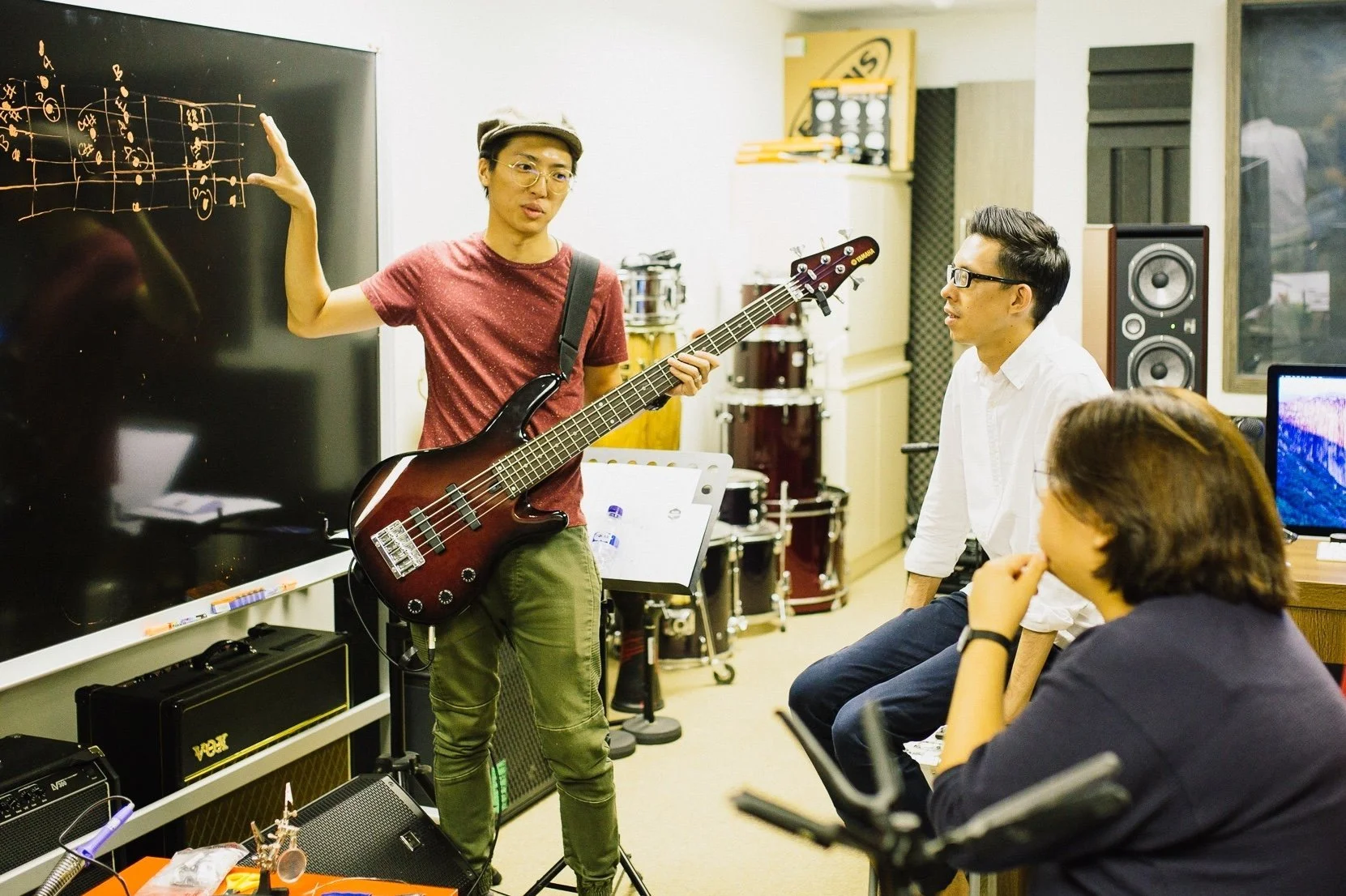Online bass lessons vs Private lessons: Which is best for you? (2025)
Are you wondering how to learn bass guitar in Singapore? Whether you're considering private lessons, online courses, self-study, consulting ancient oracles, or a hybrid of everything, this comprehensive guide will help you choose the right learning method for your goals and budget.
You don’t want to buy that sofa and then realise only when they’ve shipped it over that it was made for toddlers, and the price tag actually had an extra ‘0’ at the back.
Modern Bass Guitar Learning Methods
Learning bass guitar in 2025 offers more options than your streaming service's 'Because You Watched' recommendations. While traditional private lessons remain popular, online platforms and self-study resources have revolutionised how people learn the bass.
Choose from these main approaches:
Private bass lessons
Self-paced online learning
Hybrid learning
Understanding these different approaches is crucial as each offers unique advantages. Let's explore how these methods can align with your learning style and goals.
Why Learning Method Matters
Before diving into specific methods, it's important to understand the impact your choice will have on your bass playing journey. Your choice of learning method directly impacts:
How quickly you progress
Your development of proper technique (or lack thereof)
Your overall investment in learning the bass
Your long-term success as a bass player
QUICK COMPARISON TABLE
| Feature | Private Lessons | Online Learning | Hybrid Approach |
|---|---|---|---|
| Monthly Cost Range | $280-400 | $15-50 | $150-300 |
| Time Commitment | Fixed schedule 1-2 hours/week |
Flexible schedule Self-paced |
Mixed schedule 3-5 hours/week |
| Feedback Quality | Immediate, personalised | Delayed, general | Both immediate and delayed |
| Learning Resources | Teacher provided | Extensive online library | Combined resources |
| Skill Development | Structured, monitored | Self-directed | Balanced approach |
Private Lessons
- Weekly lessons: $70-80/hour
- Monthly total: $280-320
- Materials: $30-50/month
- Transport: $30-50/month
Pros
- Direct feedback
- Structured learning
- Personal attention
Cons
- Higher cost
- Fixed schedule
- Travel required
Online Learning
- Platform subscription: $15-30/month
- Additional courses: $0-20/month
- Practice tools: $5-10/month
- Downloads: $0-10/month
Pros
- Affordable
- Flexible timing
- Vast resources
Cons
- No direct feedback
- Self-discipline needed
- Potential bad habits
Hybrid Approach
- Monthly private lesson: $70-80
- Online subscription: $15-30
- Practice tools: $10-20
- Materials: $20-30
Pros
- Best of both worlds
- Cost-effective
- Flexible structure
Cons
- Requires planning
- Complex schedule
- Mixed commitments
Self-Study Bass Guitar LEARNING: A Complete Guide
Self-study has evolved significantly with digital technology. Modern self-learners have access to tools and resources that were unimaginable just a decade ago. Understanding these options is crucial for making an informed decision about your learning journey. Before starting your learning journey, make sure you have the right instrument - check our Top 10 Beginner Bass Guitars Guide.
What Is Self-Study Bass Learning?
Teaching yourself bass guitar means becoming your own instructor using online resources, video tutorials, and structured courses. Self-study has become an increasingly popular starting point for aspiring bassists, simply because it costs $0. Of course, ‘free’ doesn’t always mean ‘good’.
With YouTube as your virtual sensei and Google as your all-knowing guru, you'll find yourself in the company of thousands of online bass teachers - some brilliant (😉😉😉), some questionable, and some who clearly picked up their bass skills from Guitar Hero.
The good news? You can learn in your PJs. The bad news? Your PJs won't tell you when your ‘broken chicken wing’ right hand is going to cause you health problems in seven years.
Top Online Resources for Learning Bass Guitar
While numerous online resources exist, not all offer the same quality or structured approach. Some look nice from far; then when you actually use them, they’re far from nice.
The following platforms have proven track records in helping bassists develop their skills effectively with both free and paid content and tools:
SBL Academy (Scott's Bass Lessons)
Industry-leading online learning system
Professional mentor feedback on submitted videos
Active community forum
Comprehensive free lessons from beginner to advanced
Strong focus on music theory foundations
Structured learning paths
Beginner-friendly approach
Practical song-based learning
Clear progression path
Essential Practice Tools
These digital tools serve as your virtual practice companions, helping maintain rhythm, timing, and progression tracking. Incorporating them into your practice routine can significantly accelerate your learning. Modern bass practice tools include:
Digital metronomes
Speed training apps
Time signature practice tools
And of course, having the right bass is crucial - see our recommended beginner basses for every budget.
Advantages of Self-Study
Cost-effective learning path
Flexible practice schedule
Learn at your own pace
Access to diverse teaching styles
Practice any time without commuting
Challenges to Consider
No immediate technique correction
Potential for developing (and practising) incorrect habits
Requires strong self-motivation
Less structured than guided learning
Missing performance opportunities
Making Self-Study Work
Success in self-study requires:
Dedicated practice schedule
Clear learning objectives
Regular recording and self-assessment
Proper use of practice tools
Active participation in online communities
Credit: Awaken Generation
Private Bass Guitar Lessons in Singapore: What to Expect
While self-study offers flexibility and affordability, private instruction remains a cornerstone of bass education. Let's examine what makes private lessons unique and how they can benefit your development.
Understanding One-on-One Bass Instruction
Private bass lessons provide personalised guidance tailored to your goals and learning pace. A typical lesson in Singapore runs 60 minutes and includes:
Technique assessment and correction
Personalised exercise assignments
Real-time feedback on playing
Theory instruction relevant to your level
Song analysis and practice strategies
What Makes a good Bass Teacher
Key qualities to look for:
Considerable performing experience
Teaching methodology
Communication skills
Genre versatility
Student success track record
Benefits of Private Coaching
Immediate technique correction
Customised learning path
Accountability and structure
Network opportunities
Local music scene insights
Performance preparation
Location-specific gigging advice
Potential Drawbacks
Higher financial investment
Fixed schedule commitment
Location constraints
Limited to one teaching style
Dependent on teacher availability
Questions to Ask Potential Teachers
What's your teaching approach for beginners?
How do you structure progress evaluation?
What's your performance background?
How do you handle missed lessons?
What additional resources do you provide?
Hybrid Bass Learning: Combining Methods
What Is the Hybrid Approach?
Mixture of self-study and guided instruction
Combines online resources with periodic private lessons
Structured around personal learning goals
Adaptable to budget and schedule changes
Maximises benefits of multiple learning styles
Common Hybrid Structures
Monthly private lessons with self-study between sessions
Online courses supplemented by quarterly workshops
Self-directed learning with periodic technique check-ins
Community class participation with personal practice plans
Mixed online and in-person coaching
Cost-Effective Planning
Budget allocation example:
40% guided instruction
30% learning materials
20% equipment/maintenance
10% supplementary resources
Average monthly investment: $150-300
Flexible spending adjustments based on progress
Building an Effective Schedule
Creating a structured schedule is crucial for consistent progress. A well-planned schedule ensures you maintain momentum while balancing different learning activities effectively. An effective schedule is vital because it:
Ensures consistent practice and progress
Prevents burnout and overwhelm
Maximises learning from multiple sources
Maintains motivation through achievable goals
Allows for proper skill reinforcement
Here’s an example of how an effective schedule might look like:
Weekly self-practice: 3-5 sessions
Private lessons: 1-2 times monthly
Online course work: 2-3 hours weekly
Recording/assessment: 1 hour weekly
Community engagement: 2-3 hours monthly
Progress Tracking Methods
Effective progress tracking is essential because it helps maintain motivation and ensures you're moving toward your goals. Regular monitoring allows for timely adjustments to your learning approach. Here are some tools you can use for this.
Personal practice journal
Video progress recordings
Teacher feedback logs
Online course completion rates
Skill assessment checklists
Performance opportunities
While the hybrid approach offers flexibility and comprehensive learning, there are several common mistakes that can hinder progress. Being aware of these helps ensure successful implementation of your chosen learning method.
Common Pitfalls to Avoid
Inconsistent practice between lessons
Over-reliance on single learning method
Poor time management
Skipping fundamentals
Irregular feedback cycles
Decision Framework for Bass Learning Methods
Quick Assessment
Key considerations:
Time available weekly: <3 hours, 3-6 hours, or 6+ hours?
Learning preference: Visual, auditory, hands-on, or mixed?
Monthly budget: <SG$200, SG$200-400, or SG$400+?
Goals: Hobby, band playing, or professional career?
Current skill level: Complete beginner, some experience, or intermediate?
Method Matching
Understanding how different learning approaches suit various lifestyles and goals helps make an informed decision. Here's how specific methods align with common learner profiles.
Busy Professional
Available time: 2-3 hours/week
Best fit: Online courses + monthly private lessons
Estimated cost: $50/month
Focus: Flexible scheduling, structured progression
Serious Hobbyist
Available time: 4-6 hours/week
Best fit: Bi-weekly private lessons + self-study
Estimated cost: $300-350/month
Focus: Personalised feedback, steady progress
Band-Focused Learner
Available time: 6+ hours/week
Best fit: Group classes + private coaching
Estimated cost: $350-400/month
Focus: Band dynamics, repertoire building
Method Selection Checklist
✓ Matches available practice time
✓ Fits within budget
✓ Aligns with learning style
✓ Supports specific goals
✓ Provides appropriate feedback level
✓ Allows for adjustment as needed
This checklist serves as your final verification tool. Before committing to any learning method, ensure it aligns with these critical factors. Remember that your chosen approach can evolve as your skills and needs change.
Making Your Final Decision
Your choice of learning method should reflect your:
Current lifestyle and commitments
Learning style preferences
Musical aspirations
Available resources
Remember that success in bass playing comes from consistency and dedication, regardless of the learning method you choose. The best approach is one that you can maintain long-term while enjoying the learning process. Until next time, fellow low-end lovers!



